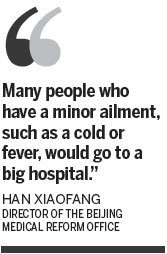Doctors treat patients by video in clinic trial
Online consultations seen as way to relieve pressure on big hospitals
Rather than waiting in long lines to see a doctor, residents of Guangdong province can go instead to a nearby pharmacy, have a video chat with a physician from a top-notch hospital and buy medicine at the store. The process can be completed in minutes.
Guangdong No 2 Provincial People's Hospital, in Guangzhou, launched the first online hospital in the country on Tuesday, offering the new option for patients with common or chronic ailments.
The patients can register at one of the 30 community clinics or pharmacies authorized in the province, log in, talk to a doctor, receive and print a prescription and buy the medicine.
In the past month of trials, the virtual hospital received 60 to 100 patients a day, most of them having coughs, fevers or headaches, said Zhang Shengming, director of the development department at the hospital.
Doctors treated the symptoms and guided the patients in taking their medicine. When they found a complex situation, they recommended an in-person checkup at a brick-and-mortar hospital.
The online hospital can help people get in the habit of visiting community medical facilities for minor diseases to reduce crowding at large hospitals, said Tian Junzhang, Guangdong No 2's president.
It can guide both doctors and patients to avoid over-treatment and assist pharmacies in safeguarding drug quality.

The new service is free for now, but the hospital has applied to the price management authorities for approval to charge 10 yuan ($1.64) per patient visit.
Online hospitals have become more established in developed countries. For example, the services are extended to families in vast and sparsely populated Australia, Tian said.
Remote medical service is one of the goals of ongoing medical reform in the country, said Ou Yiqiang, an official with the provincial Health and Family Planning Commission.
The online hospital becomes a key innovation in spreading quality medical resources at the grassroots level, he said.
According to a circular issued by the National Health and Family Planning Commission in August, health authorities will encourage medical institutions to develop remote medical services to optimize distribution of resources and relieve difficulties that patients have in accessing quality medical services.
Most reputable hospitals in China are found in a few big cities, such Beijing and Shanghai, resulting in overcrowding at big hospitals and discrepancies in access to medical resources between the developed coastal areas and the underdeveloped western areas.
In Beijing, big hospitals, which are rich in medical resources and technology, are crowded with patients daily, but the more numerous small hospitals and clinics attract few, according to Han Xiaofang, director of the Beijing Medical Reform Office.
"Many people who have a minor ailment, such as a cold or fever, would go to a big hospital," she said. "Instead, such ailments can be cured equally well at clinics. Not using them is a big waste of limited medical resources."
Compared with remote services that allow doctors at different locations to discuss cases, the online hospital links up the doctor and patient, Tian, of Guangdong No 2, said.
The hospital hopes to multiply use of the clinic and pharmacy dramatically in the long term.
Wang Xiaodong and Shan Juan in Beijing contributed to this story.
liwenfang@chinadaily.com.cn
(China Daily 11/01/2014 page4)
- NHC minister visits Cuba
- NHC vice-minister meets with president of GE HealthCare
- NHC minister holds talks with WHO director-general via video link
- NHC minister meets with German health minister
- China to allow wholly foreign-owned hospitals in certain areas
- China's average life expectancy rises to 78.6 yrs


